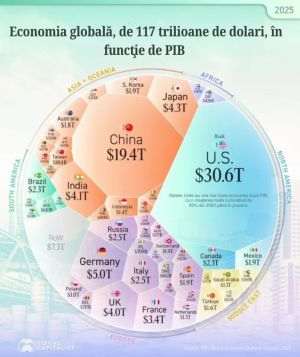Cryptocurrencies can no longer be ignored by banks and categorized as a fringe movement, something which has become increasingly evident lately as investment in the cryptocurrency market has grown considerably, and high-profile names such as Elon Musk are promoting the widespread adoption of digital currencies.
The cryptocurrency market has now reached a value of hundreds of billions of dollars and is attracting more and more investors every day, both individuals and well-known companies. Thus, banks and the entire current financial system are under pressure from customers requesting crypto assets.
In addition, Wall Street banks are being forced to accept bitcoin as a legitimate asset class, according to CNBC.
JPMorgan co-chair Daniel Pinto said at an internal meeting that he was open when it comes to Bitcoin, and the company's decision to adopt Bitcoin would be made if a critical mass of customers wanted the company to trade in it.
"If over time an asset class develops that is to be used by various asset managers and investors, we will have to be involved," Pinto said in an interview, according to CNBC, adding: "The demand is not there yet. but I'm sure it will be at some point."
JPMorgan traders are not the only ones turning their attention to cryptocurrencies. Last week, Goldman Sachs hosted a private forum with Mike Novogratz, CEO of crypto company Galaxy Digital, for employees and customers. During this meeting, Novogratz presented his thesis for bitcoin, ethereum and other digital assets, as well as their macroeconomic history.
Wall Street's new openness to cryptocurrencies shows that the industry is forced to tackle bitcoin, as its latest dizzying rise to near the $ 50,000 threshold and increased adoption among institutional investors, corporations and fintech competitors raise fears of being left behind.
Banks, which generally face the highest regulatory control among financial firms because of the breadth of their operations and the crucial role in the economy, have been largely reluctant when it comes to the crypto market, preferring to focus on related technology, including the blockchain. However, experts believe that if one of the six largest US banks decided to adopt bitcoin, it would be a major seal of approval for the developing asset class, according to CNBC.
The publication mentions that during the bitcoin growth cycle of 2017, banks, including Goldman, flirted with the idea of setting up dedicated crypto trading desks, but in the end most of the plans remained at the idea level. Born less than a decade before the global financial crisis, bitcoin was considered too speculative and risky for the bank's customers. As the price of bitcoin rose sharply in late 2017, JPMorgan CEO Jamie Dimon called bitcoin a fraud that would not end well.
But simply by continuing to exist until 2018 and 2019, weak years known as crypto-winters, when Bitcoin traded below $ 4,000, the technology has shown its staying power. Then the coronavirus pandemic hit, and governments unleashed billions of dollars in support of markets, businesses and individuals during the crisis.
So a new narrative has emerged, seemingly adapted to the current context and adopted by billionaire hedge fund managers such as Paul Tudor Jones and Stanley Druckenmiller: Bitcoin, which is limited in terms of availability through its structure, is a haven from inflation and the deterioration of the US dollar.
Fear of currency devaluation is the main theme of American customers asking about bitcoin, according to the head of a major company that manages wealth for customers with at least 25 million net worth, according to CNBC. The bank is studying how to integrate cryptocurrency into its risk management systems.
However, jokes are making the rounds in the market - in a few years, bitcoin has moved from an idealistic technology designed to eliminate banks and other intermediaries, to a means of protecting value used mostly by rich people so that they can stay rich.
Now, as a steady stream of news about adopters seems to be pushing bitcoin more and more, those in the industry say it's only a matter of time before traditional banks get more involved.
In particular, Pinto, from JPMorgan, last month cited the move by BlackRock, the world's largest asset manager, to add bitcoin futures as an eligible investment in two of its funds as evidence of wider adoption. Regulating bitcoin trading could be manageable, Pinto said, adding that if it happened, trading would involve verified customers and reputable exchanges, including Coinbase.
Just last week, electric car maker Tesla became the latest company to invest capital in bitcoin, and payment network Mastercard and custodian bank BNY Mellon said they would become more involved in the crypto market. With each announcement, the likelihood that banks, including JP Morgan and others decide to join the trend, is increasing.
"For large banks, the volume of customer demand will break the current system, at some point", said Damien Vanderwilt, co-chair of Galaxy and head of its global markets division, according to CNBC. "Eventually, banks become heavily armed in the development of these products by their customers," he added.
Vanderwilt suggested future collaborations with traditional banks, saying that "Galaxy may help Goldman and other banks not face the same challenges of the past; we are uniquely positioned to do this, like Nexus for financial services in the digital assets sector. "
As for corporate adopters, Vanderwilt said many companies have not yet publicly disclosed their investments in bitcoin. "You will see a series of versions in 2021, there will be more companies, pensions, more insurance companies" investing in bitcoin, he said.
As for corporate adopters, Vanderwilt said many companies have not yet publicly disclosed their investments in bitcoin. "You will see a series of versions in 2021, there will be more companies, pensions, more insurance companies" investing in bitcoin, he said.
Meanwhile, as the price of bitcoin continues to rise, some big bank traders are looking at the charts with envy. Just two months ago, bitcoin crossed the $ 20,000 mark for the first time, and on Saturday it was close to the $ 50,000 mark, according to Coin Metrics.
"In this industry, we are always looking for things that will make money," a trader who wanted to remain anonymous told CNBC. "And there's this brilliant thing, so weird, volatile, and we're told we can't touch it - it's like the forbidden fruit."
On the other hand, the number of companies and online stores that accept bitcoin or other cryptocurrencies is constantly growing, and this creates a safe climate for the use of cryptocurrencies to pay for products online and the use of bitcoin in Ecommerce. In fact, in our country there are more and more companies that accept bitcoin. From travel agencies to fitness passes, beauty salons and even restaurants or home appliance stores.
• Cryptocurrencies draw attention from regulators
All this close attention to cryptocurrencies has also attracted comments from regulators, who support the need for closer controls on cryptocurrencies.
Cryptocurrencies attract the attention of regulators
All this close attention to cryptocurrencies has also attracted comments from regulators, who support the need for tighter controls on cryptocurrencies.
US Treasury Secretary Janet Yellen recently said that virtual currencies have made promises, but have also been used to launder money by drug traffickers and terrorists. However, she added that innovation could help solve these problems and that the technology could be used to fill digital gaps.
In addition, European Central Bank President Christine Lagarde has expressed similar concern, calling for global regulation of bitcoin. At a Reuters press conference, she said: "Bitcoin is an extremely speculative asset, which has led to some funny business and some interesting and totally reprehensible money laundering activities."
Both the US and the EU are talking about regulations in the cryptocurrency market. India is not far behind either. Recently, the Minister of State for Finance, Anurag Singh Thakur, declared that a bill for cryptocurrencies is being finalized and that it will soon be sent to the Union Cabinet. Finance Minister Nirmala Sitharaman, while answering the question from Rajya Sabha, said that a high-level committee - formed to study issues related to virtual currencies - had recommended a ban on all private cryptocurrencies in the country. It is unknown at this time whether the government will go through with this and it will ban krypto, but the crypto-club is hoping they won't.
Even the Deputy Governor of the Bank of Canada, Tim Lane, was quite vocal about his views on cryptocurrencies. He called crypto a "flawed" payment method, adding: "The recent rise in their prices is less like a trend and more like a speculative mania."
Existing laws are clearly on one side, even as more and more institutional investors and corporations enter the crypto market.
Given the divergent views and clear division over cryptocurrencies, even within the investor community, a confusion between the two sides (a lot of loyal money and believers vs. regulators) things could end rather badly. This is a big risk and not just for the cryptocurrency market.
CNBCTV states in an overall analysis that estimates put the market capitalization of over 8,000 cryptocurrencies at over $ 1.4 trillion. Of those, bitcoin alone is nearly $ 900 billion, followed by Ethereum with $ 200 billion. In contrast, the global stock market capitalization is $ 90 trillion, the S & P-500 market cap is $ 31 trillion, and India's market capitalization is $ 2.8 trillion. So virtual currencies are still a fairly small but not negligible asset. However, what is more important is the pace at which the valuation is rising. The price of bitcoin has risen from $ 11,000 to $ 48,000 in 5 months. And if it continues to grow at this rate, the calculations may indicate the direction it is heading.
According to the CNBCTV analysis, crypto is a fast growing market and although the collective value is relatively small compared to other asset classes, such as stocks, it is not so small as to be ignored.
At the same time, the CNBCTV analysis shows that the S&P-500 and bitcoin have had a positive correlation of 0.84 in the last 14 months - from January 2020. The S&P-500 and oil are also positively correlated, but to a slightly lower degree, of 0.77 in the same period. What this suggests, according to the analysis, is that bitcoin and stocks tend to move in tandem, though not at the same pace. Therefore, it is quite likely that if one of these markets is affected, the other feels the effects as well.
Money finds its way to several assets, but when this money is affected in a single market, being a link, there are some effects in others as well.
So any action by regulators on cryptocurrencies could not only lead to a sudden correction in their values, but will also cause a similar effect on other asset markets, especially stocks.
CNBCTV analysis also shows that crypto bubbles are not new. From a high of nearly $ 20,000 in 2017, the price of Bitcoin dropped to nearly $ 3,600 by the end of 2018.
The main question in the market is whether history will repeat itself.
However, for equity investors, the message is clear. Everyone has to watch the crypto space carefully, because what is happening there can also cause a blow to everyone's portfolio.























































